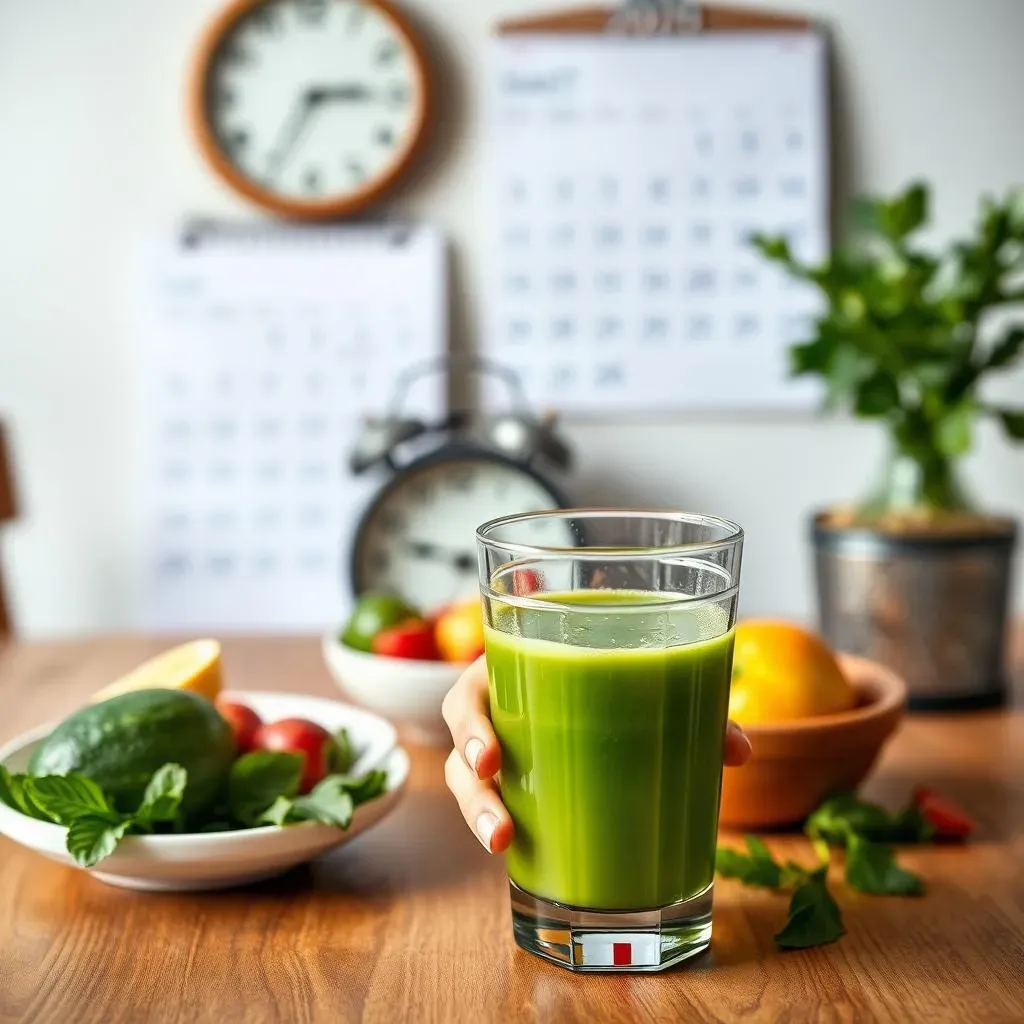Table of Contents
Have you ever considered a juice detox for a quick weight loss fix? The internet is flooded with promises of dramatic results from a "juice detox 3 day weight loss" plan. But are these claims backed by science, or are they just clever marketing? This article cuts through the hype to examine the reality of juice detox 3-day weight loss programs. We'll explore what these cleanses actually do to your body, separating fact from fiction. We'll dive into the potential benefits and, more importantly, the significant risks associated with such rapid weight loss methods. Finally, we'll offer healthier, more sustainable approaches to weight management and detoxification, helping you achieve your wellness goals without compromising your health. Prepare to learn the truth about juice detox 3 day weight loss and empower yourself to make informed decisions about your body.
Understanding Juice Detox 3Day Weight Loss Claims

Understanding Juice Detox 3Day Weight Loss Claims
The Allure of Quick Fixes
Let's be honest, the idea of a juice detox for 3-day weight loss is incredibly tempting. Who wouldn't want to shed a few pounds quickly and easily? Marketing materials often prey on this desire, promising rapid results with minimal effort. Images of vibrant, healthy juices flood websites and social media, creating an association between these drinks and immediate weight loss. These campaigns often highlight testimonials from satisfied users, further reinforcing the perception of a simple solution to a complex problem. But is it really that simple?
Many juice detox programs emphasize a "cleansing" effect, suggesting that the body is rid of toxins and impurities. This plays into a common misconception that the body needs external help to detoxify. However, the truth is that our livers and kidneys already perform these essential functions efficiently. The emphasis on detoxification often distracts from the more realistic aspects of weight loss, such as sustained lifestyle changes including diet and exercise.
Marketing Tactic | Effect on Consumer |
|---|---|
Before-and-after photos | Creates a perception of dramatic, easy weight loss |
Testimonials | Builds trust and reinforces positive experiences (potentially misleading) |
Emphasis on "detoxification" | Appeals to the desire for a quick, easy solution |
Dissecting the Claims: What's Really Happening?
While a 3-day juice cleanse might lead to some initial weight loss, it's crucial to understand why. This weight loss is primarily due to fluid loss and a significant reduction in calorie intake. The body is simply shedding water weight, not actual fat. Once you resume your normal diet, this weight is very likely to return. Furthermore, many juice cleanses lack essential nutrients like protein and fiber, which are vital for long-term health and satiety. This lack of nutrients can lead to fatigue, muscle loss, and other negative side effects.
It's important to remember that sustainable weight loss is a gradual process. It involves making long-term lifestyle changes, including a balanced diet and regular exercise. A 3-day juice cleanse might provide a temporary boost, but it's not a solution for sustained weight management. Instead of focusing on short-term fixes, consider building healthy habits that will support your weight loss goals over time.
- Water weight loss, not fat loss
- Nutrient deficiencies (protein, fiber)
- Unsustainable for long-term weight management
- Potential for rebound weight gain
The Science Behind Juice Detox 3Day Weight Loss

The Science Behind Juice Detox 3Day Weight Loss
Calorie Restriction and Weight Loss
The most significant factor contributing to weight loss during a 3-day juice cleanse is the drastic reduction in calorie intake. Juices, even those packed with fruits and vegetables, are generally lower in calories than solid foods. This calorie deficit forces the body to tap into its energy stores, leading to a decrease in weight. However, this weight loss is often temporary and primarily consists of water weight and glycogen depletion. It's not a reduction in body fat. Once normal eating habits resume, the lost weight is likely to return.
Think of it like this: you're temporarily running your car on fumes. You might see a temporary improvement in fuel efficiency (weight loss), but you're not actually fixing the car (building healthy habits). This approach is unsustainable and can even lead to metabolic slowdown if repeated frequently. The body adapts to prolonged calorie restriction by slowing down its metabolism, making it harder to lose weight in the future.
Factor | Effect on Weight |
|---|---|
Calorie Deficit | Temporary weight loss, primarily water weight and glycogen |
Reduced Fiber | May lead to decreased satiety, increased hunger |
Nutrient Deficiency | Potential for muscle loss, fatigue, and other health issues |
Nutrient Deficiencies and Metabolic Effects
Many juice cleanses lack sufficient protein and fiber, which are crucial for maintaining muscle mass, feeling full, and regulating blood sugar levels. Without adequate protein, the body may start breaking down muscle tissue for energy, resulting in muscle loss and a slower metabolism. The absence of fiber can lead to increased hunger and cravings, making it difficult to maintain the restrictive diet. This can further hinder long-term weight management efforts.
Furthermore, the high sugar content in many fruit juices can lead to blood sugar spikes and crashes, causing energy fluctuations and increased cravings. This can negatively impact overall health and make it more challenging to stick to a healthy eating plan. The absence of essential micronutrients also can lead to fatigue, weakness and other negative health consequences. It's important to remember that a balanced diet providing all essential nutrients is crucial for both weight management and overall well-being.
- Protein deficiency: Muscle loss, metabolic slowdown
- Fiber deficiency: Increased hunger, cravings
- High sugar content: Blood sugar fluctuations, energy crashes
- Micronutrient deficiencies: Fatigue, weakness, other health issues
Potential Risks of Juice Detox 3Day Weight Loss

Potential Risks of Juice Detox 3Day Weight Loss
Hidden Dangers of Extreme Dieting
While the allure of rapid weight loss is strong, it's crucial to understand the potential health risks associated with juice detox 3-day weight loss plans. These extreme diets often lack essential nutrients, leading to various health problems. Nutrient deficiencies can cause fatigue, muscle loss, weakened immunity, and even more serious complications. The drastic calorie restriction can also disrupt metabolism, making it harder to lose weight in the long run and potentially leading to metabolic slowing.
Furthermore, the lack of fiber in many juice cleanses can negatively impact gut health. Fiber is essential for regular bowel movements and a healthy gut microbiome. A lack of fiber can lead to constipation, bloating, and other digestive issues. The high sugar content in some juices can also lead to blood sugar imbalances, potentially worsening existing conditions like diabetes. The sudden and significant dietary shift can also trigger headaches, dizziness, and other withdrawal symptoms in some individuals.
Risk | Potential Consequence |
|---|---|
Nutrient Deficiencies | Fatigue, muscle loss, weakened immunity, digestive problems |
Metabolic Disruption | Slower metabolism, difficulty losing weight long-term |
Lack of Fiber | Constipation, bloating, digestive issues |
High Sugar Content | Blood sugar imbalances, potential worsening of existing conditions |
Who Shouldn't Try a Juice Cleanse?
Individuals with certain health conditions should absolutely avoid juice cleanses. People with diabetes, eating disorders, or those taking medications should consult their doctor before attempting any drastic dietary changes. Pregnant or breastfeeding women should also avoid juice cleanses due to potential nutrient deficiencies and the lack of essential nutrients for the baby's development. Anyone with a history of disordered eating should steer clear of these potentially triggering diets.
Remember, a healthy approach to weight loss involves making sustainable lifestyle changes, including a balanced diet and regular exercise. If you're concerned about your weight or overall health, consult a healthcare professional or registered dietitian for personalized guidance. They can help you develop a safe and effective plan that meets your individual needs and health status.
- People with diabetes
- Individuals with eating disorders
- Those taking certain medications
- Pregnant or breastfeeding women
- Anyone with a history of disordered eating
Healthier Alternatives for 3Day Weight Loss and Detox

Healthier Alternatives for 3Day Weight Loss and Detox
Sustainable Weight Loss Strategies
Let's ditch the quick fixes and embrace sustainable weight loss. Instead of a crash diet, focus on gradual, healthy changes that you can maintain long-term. This means incorporating a balanced diet rich in whole foods, including plenty of fruits, vegetables, lean protein, and whole grains. Think of it like building a strong house—you wouldn't use flimsy materials, right? Similarly, sustainable weight loss requires a solid foundation of healthy habits.
Regular exercise is another key component. Find activities you enjoy, whether it's dancing, swimming, hiking, or simply taking a brisk walk. Aim for at least 150 minutes of moderate-intensity aerobic activity per week, along with strength training exercises twice a week. Remember, consistency is key. Small, regular changes are far more effective than extreme measures that are difficult to maintain.
Healthy Habit | Benefits |
|---|---|
Balanced Diet | Provides essential nutrients, sustained energy, improved satiety |
Regular Exercise | Burns calories, builds muscle, improves mood and overall health |
Sufficient Sleep | Regulates hormones, reduces cravings, improves energy levels |
Prioritizing Whole Foods and Hydration
Instead of relying on processed juices, focus on incorporating whole, unprocessed foods into your diet. Fruits and vegetables are packed with essential nutrients and fiber, providing sustained energy and promoting healthy digestion. Prioritize whole, unprocessed foods over processed options. Choose lean protein sources like chicken, fish, beans, and lentils. Opt for complex carbohydrates such as whole grains and starchy vegetables, providing sustained energy.
Hydration is also crucial for overall health and well-being. Drinking plenty of water throughout the day helps regulate bodily functions, promotes healthy digestion, and can even help curb appetite. Aim for at least eight glasses of water per day. You can also incorporate hydrating foods like fruits and vegetables into your diet. Remember, a well-hydrated body functions optimally, supporting weight management efforts.
- Prioritize whole, unprocessed foods
- Choose lean protein sources
- Opt for complex carbohydrates
- Drink plenty of water
- Incorporate hydrating foods
The Importance of Professional Guidance
If you're struggling with weight loss or have any underlying health conditions, seeking professional guidance is essential. Registered dietitians and healthcare professionals can create personalized plans tailored to your specific needs and health status. They can help you develop a safe and effective approach to weight management, addressing any underlying health concerns. Remember, sustainable weight loss is a journey, not a race. It’s important to be patient and celebrate your progress along the way.
Don't be afraid to seek support. Connect with friends, family, or support groups who can encourage and motivate you. Building a supportive network can make a significant difference in your weight loss journey. Remember, lasting change comes from within. Focus on building healthy habits that you can maintain long-term, rather than seeking quick fixes.